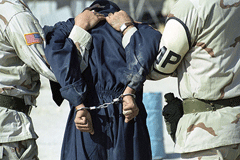
When Stephen Harper visited George W. Bush this week, neither man had anything to say about the U.S. prison and torture facility at Guantanamo Bay. Despite a recent UN report calling for the closing down of the "Gitmo" operation, and a Supreme Court ruling against the military tribunals being used there, Canada's government has been a notable exception to the growing international outrage.
Anyone in Canada doubting the shame of Ottawa's official silence ought to go see The Road to Guantanamo, which opens in Vancouver today (Friday, July 7) at the Fifth Avenue Theatres. The film is a jarring docudrama that follows the case of the "Tipton Three," young British Muslims who travelled to Pakistan in the fall of 2001 and ended up -- after finding their way to Afghanistan and then into the custody of Northern Alliance forces -- enduring two years of barbarism at Guantanamo, before being fully exonerated and repatriated.
Co-directors Michael Winterbottom (The Road to Sarajevo) and Mat Whitecross deftly construct a coherent narrative by interweaving the two formats, combining reflective interviews done with the three after their release and dramatic re-enactments of their very real and traumatic experiences in captivity. Cameo appearances by Bush and the inimitable Donald Rumsfeld provide some of the punch lines to the story; the most memorable of these is courtesy of the septuagenarian Secretary of Defense, who deadpans infamously that U.S. treatment of prisoners is "consistent with the Geneva Convention, for the most part."
Tough viewing
As you might imagine, the film is difficult to watch in parts, with its depiction of the rampant physical abuse, torture and humiliation of the detainees. Winterbottom inserts several lighter moments, small glimmers of human dignity and solidarity -- even a couple between guard and prisoner. In one scene, for instance, after suffering weeks of enforced silence in an outdoor cage, one of our protagonists is invited to rap some lines for a U.S. soldier. Our hero then proceeds to free-style a proclamation of his innocence and a denunciation of the other guards for their ignorance of their captives' culture and religion.
The inclusion of these scenes interrupts the relentless brutality and absurdity of Guantanamo. More significant even than the constant physical abuse meted out, the film highlights the racist, misogynistic and myopic culture of the U.S. authorities. Aside from the usual "camel-jockey" slurs from the Americans, the film depicts the desecration of the Koran and the savage beating of a prisoner who had the audacity to violate the no exercise rule by praying. The total disrespect for the customs and way of life of the "other" is a too often unmentioned but fundamental contradiction of the notion that the U.S. can "export" democracy, women's rights and so forth to the Middle East and beyond.
What's new?
Many observers have pointed to the Abu Ghraib scandal, which broke out over two years ago with its shocking photographic evidence of torture, as a key turning point against the U.S. in its occupation of Iraq. Guantanamo reminds us that prisoner abuse and systemic violation of international law did not begin with the invasion of Baghdad. Torture has been part and parcel of the so-called "war on terror" from its beginning. In fact, it has always been an instrument of military control and domination.
Strident denunciations of the Bush administration are becoming increasingly common in both documentary and feature films. In fact, the cultural world in general appears to be "piling on" the increasingly unpopular president who commands the "war on terror." (And it is no longer just re-invigorated anti-war veterans like Neil Young and Bruce Cockburn. Now even Pink is onboard with her cutting tune "Dear Mr. President.")
For its part, The Road to Guantanamo requires no star power to make its point. It is a film for our difficult times, with an unsubtle and urgent political message.
Now somebody just needs to organize a screening at 24 Sussex Drive.
Derrick O'Keefe is founding editor of Vancouver-based Seven Oaks Magazine.
Related Tyee stories: In two pieces, Michael Byers looked at Stephen Harper's U.S.-linked foreign policy and whether Canada is aiding U.S. torture; and Deborah Campbell interviewed veteran White House correspondent Helen Thomas, a critic of the U.S. war on terror. ![]()














Tyee Commenting Guidelines
Comments that violate guidelines risk being deleted, and violations may result in a temporary or permanent user ban. Maintain the spirit of good conversation to stay in the discussion.
*Please note The Tyee is not a forum for spreading misinformation about COVID-19, denying its existence or minimizing its risk to public health.
Do:
Do not: